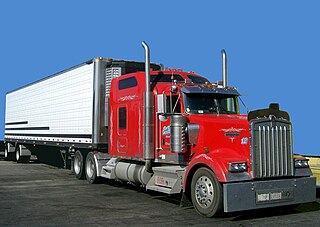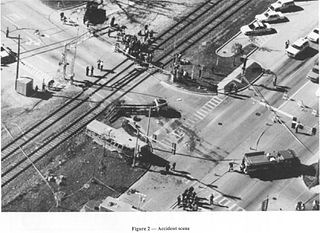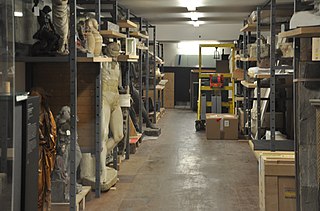
A flight attendant, traditionally known as a steward or stewardess ; or air host or hostess, is a member of the aircrew aboard commercial flights, many business jets and some government aircraft. Collectively called cabin crew, flight attendants are primarily responsible for passenger safety and comfort.

A conductor or guard is a train crew member responsible for operational and safety duties that do not involve actual operation of the train/locomotive. The conductor title is most common in North American railway operations, but the role is common worldwide under various job titles. In Commonwealth English, a conductor is also known as guard or train manager.
Career development refers to the process an individual may undergo to evolve their occupational status. It is the process of making decisions for long term learning, to align personal needs of physical or psychological fulfillment with career advancement opportunities. Career Development can also refer to the total encompassment of an individual's work-related experiences, leading up to the occupational role they may hold within an organization.

A bus stop is a place where buses stop for passengers to get on and off the bus. The construction of bus stops tends to reflect the level of usage, where stops at busy locations may have shelters, seating, and possibly electronic passenger information systems; less busy stops may use a simple pole and flag to mark the location. Bus stops are, in some locations, clustered together into transport hubs allowing interchange between routes from nearby stops and with other public transport modes to maximise convenience.

Accessibility is the design of products, devices, services, vehicles, or environments so as to be usable by people with disabilities. The concept of accessible design and practice of accessible development ensures both "direct access" and "indirect access" meaning compatibility with a person's assistive technology.

A dispatcher is a communications worker who receives and transmits information to coordinate operations of other personnel and vehicles carrying out a service. Emergency organizations including police departments, fire departments, and emergency medical services departments as well as civilian organizations such as motorcycle couriers, taxicab providers, trucking companies, railroads, bus systems, and public utility companies, use dispatchers to relay information, direct personnel, and coordinate their operations.

A commercial driver's license (CDL) is a driver's license required in the United States to operate large and heavy vehicles or a vehicle of any size that transports hazardous materials or more than 15 passengers.
In human resource development, induction training introduces new employees to their new profession or job role, within an organisation. As a form of systematic training, induction training familiarises and assists new employees with their employer, workforce and job design. The scale of induction training varies between organisations, with smaller firms typically conducting induction in the early months of employment, in comparison to larger corporations who dedicate greater time and resources to its completion.
Adaptive behavior is behavior that enables a person to cope in their environment with greatest success and least conflict with others. This is a term used in the areas of psychology and special education. Adaptive behavior relates to everyday skills or tasks that the "average" person is able to complete, similar to the term life skills.

Room service or in-room dining is a hotel service enabling guests to choose items of food and drink for delivery to their hotel room for consumption. Room service is organized as a subdivision within the food and beverage department of high-end hotel and resort properties. It is uncommon for room service to be offered in hotels that are not high-end, or in motels. Room service may also be provided for guests on cruise ships. Room service may be provided on a 24-hour basis or limited to late night hours only. Due to the cost of customized orders and delivery of room service, prices charged to the patron are typically much higher than in the hotel's restaurant or tuck shop, and a gratuity is expected in some regions.

The 1995 Fox River Grove bus–train collision was a grade crossing collision that killed seven students riding aboard a school bus in Fox River Grove, Illinois, on the morning of October 25, 1995. The school bus, driven by a substitute driver, was stopped at a traffic light with the rearmost portion extending onto a portion of the railroad tracks when it was struck by a Metra Union Pacific Northwest Line train en route to Chicago.
Competence is the set of demonstrable characteristics and skills that enable and improve the efficiency or performance of a job. Competency is a series of knowledge, abilities, skills, experiences and behaviors, which leads to effective performance in an individual's activities. Competency is measurable and can be developed through training.

A bus driver, bus operator, or bus captain is a person who drives buses for a living.

The New Jersey State Parole Board is a governmental body in the U.S. State of New Jersey that is responsible for assisting offenders to reenter society as law-abiding residents. To improve the safety of the public and the quality of life in New Jersey by administering an innovative parole system that addresses the needs of the community, victims, and offenders through a responsible decision-making process that provides every available opportunity for successful offender reintegration.

A driving instructor is a person who is hired by a new driver who is learning how to improve their skills - often for an upcoming practical test. Different countries have different rules regarding permits and other regulations. Driving instructors have several tasks such as teaching new drivers the theory and techniques needed to carefully operate various types of vehicles such as cars, motorcycles, trucks and buses. A driving instructor has several names and can be recognized as: auto driving instructor, educator, instructor, teacher, driver trainer or truck driving instructor.

The Special Forces Qualification Course (SFQC) or, informally, the Q Course is the initial formal training program for entry into the United States Army Special Forces. Phase I of the Q Course is Special Forces Assessment and Selection (SFAS). A candidate who is selected at the conclusion of SFAS will enable a candidate to continue to the next of the four phases. If a candidate successfully completes all phases they will graduate as a Special Forces qualified soldier and then, generally, be assigned to a 12-men Operational Detachment "A" (ODA), commonly known as an "A team." The length of the Q Course changes depending on the applicant's primary job field within Special Forces and their assigned foreign language capability but will usually last between 56 and 95 weeks.

The Driver and Vehicle Standards Agency (DVSA) is an executive agency of the UK Department for Transport (DfT).

A collection manager ensures the proper care and preservation of objects within cultural institutions such as museums, libraries, and archives. Collection managers, along with registrars, curators, and conservators, play an important role in collections care. Collection Managers and Registrars are two distinct collection roles that are often combined into one within small to mid-size cultural institutions. Collection Managers can be found in large museums and those with a history and natural history focus whose diverse collections require experienced assessment to properly sort, catalog, and store artifacts. A collection manager may oversee the registrar, archivist, curator, photographer, or other collection professionals, and may assume the responsibilities of these roles in their absence within an organization.

An art handler, also sometimes called an art preparator, is a trained individual who works directly with objects in museums, art galleries and various other venues including private collectors, corporate art collections, public art collections and various other institutions. Art handlers work in coordination with registrars, collection managers, conservator-restorers, exhibition designers, and curators, among others, to ensure that objects are safely handled and cared for. Often they are responsible for packing and unpacking art, installing and deinstalling art in exhibitions, and moving art around the museum and storage spaces. They are an integral part of a museum and collections care.

Educational management refers to the administration of the education system in which a group combines human and material resources to supervise, plan, strategise, and implement structures to execute an education system. Education is the equipping of knowledge, skills, values, beliefs, habits, and attitudes with learning experiences. The education system is an ecosystem of professionals in educational institutions, such as government ministries, unions, statutory boards, agencies, and schools. The education system consists of political heads, principals, teaching staff, non-teaching staff, administrative personnel and other educational professionals working together to enrich and enhance. At all levels of the educational ecosystem, management is required; management involves the planning, organising, implementation, review, evaluation, and integration of an institution.















